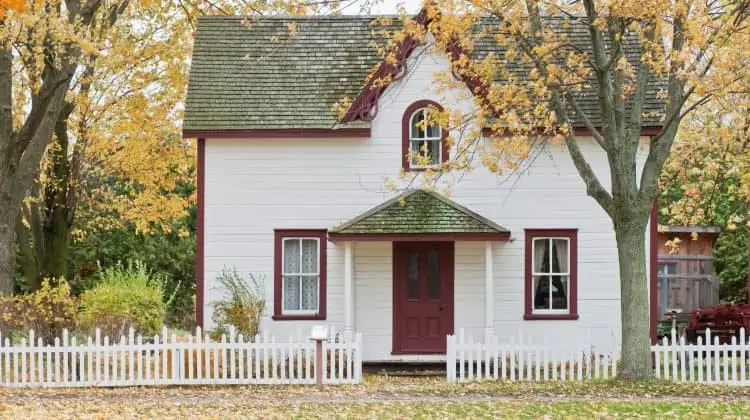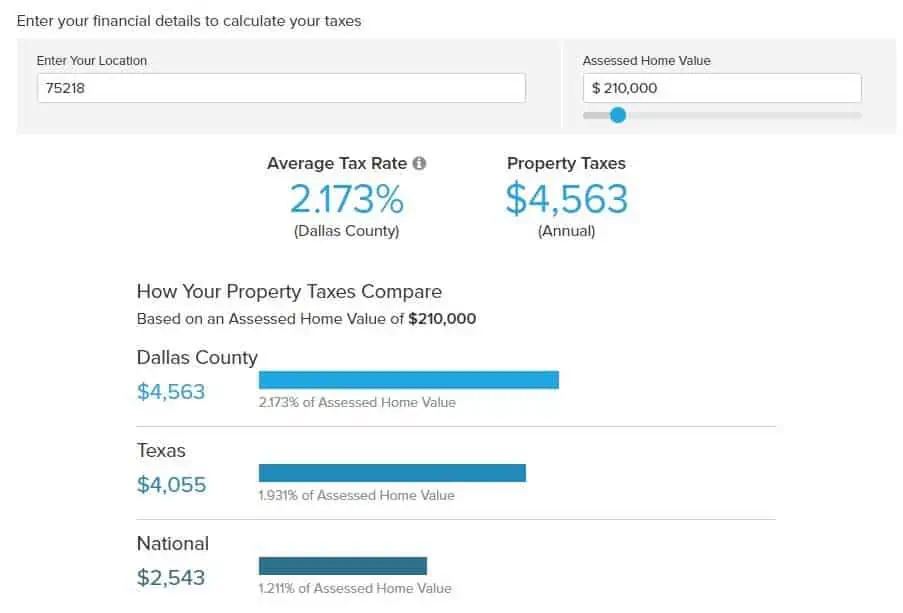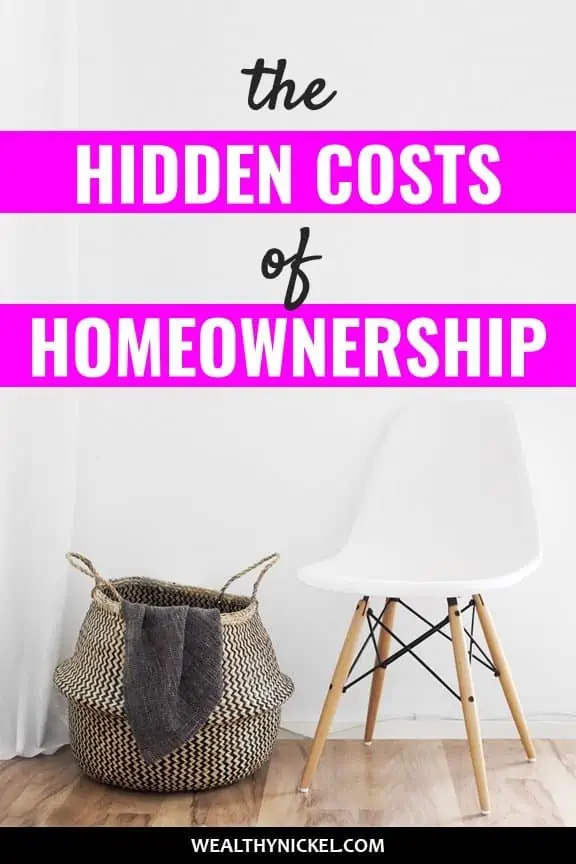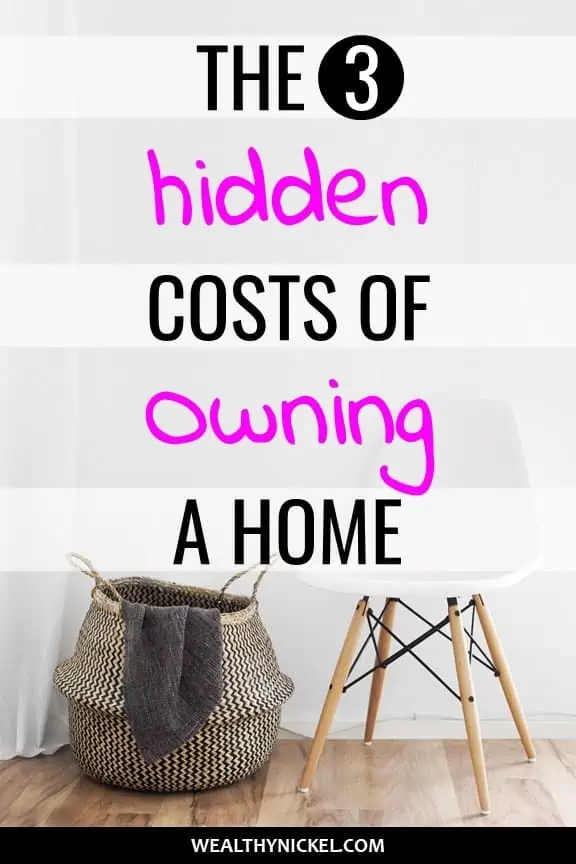I love owning my home. I could probably never go back to renting.
I don’t want anyone telling me how much noise I can make, how big a nail I can use to hang a picture, or that I can’t paint my wall neon orange. (Not that I would do that, but I bet if my kids got ahold of that idea I’d end up with a neon orange wall…)
But when you sit down and look at the numbers, it can be shocking to see just how much homeownership costs you over the years.
It pains me to see people making the rent vs. buy decision based on a comparison of the rent to the mortgage.
“Hey, if I buy a house, my mortgage payment will be less than my rent, look at all the money I’ll save!”
Yeah, not so much…
Homeownership comes with a whole new set of costs and responsibilities you’ve probably never considered if you’ve rented your whole life. Insurance? Property taxes? Calling a plumber? This is next level adulting.
Related: The Simple Path to Financial Freedom
Renting vs Homeownership
This is not an article about renting vs. buying. There are a thousand pros and cons to each, and many of them are not purely financial.
From a financial perspective, the general advice is if you plan to live in the same place for at least 5 years it may make sense to buy instead of rent. Buying comes with high transaction costs (3-5% when you buy, and 8-10% when you sell). Even though houses tend to appreciate at about the rate of inflation, you have to give it a few years to overcome the exorbitant closing costs.
However, choosing to buy a home can often be a more emotional decision than a financial one. I have owned 3 different homes over the last 10 years, and each one of them I was pretty sure I would stay in for a long time. But life circumstances change.
My Homeownership Journey
My first house was great for house-hacking and I rented rooms to a couple friends, but when I got married we wanted a little different lifestyle, so we downsized to a condo in a more walkable area of town. Then when we had kids, we decided a private yard would be good for the kids (and our sanity), so we bought yet another house.
While we came out alright financially, a lot of it was due to the huge increases in home values after the Great Recession, and not to my brilliant decision-making. It takes a lot of work (and/or money to pay others to do the work) to maintain a house, and I learned along the way that there are a lot of hidden costs that don’t really get talked about when you’re getting ready to buy your first home.
The Costs of Homeownership Included in Your Mortgage
If you read many mainstream articles about renting vs. buying, they often compare the cost of rent to the mortgage, and use that to determine whether renting or buying is the right decision.
They are right that the mortgage is a major part of the cost of homeownership, though it is not the full story. But understanding the costs that go into the mortgage (above and beyond the principal and interest) are important.
Here is what you are paying for as part of that monthly payment.
Principal and Interest
This is the most obvious cost associated with homeownership. If you get a loan, you have to pay the bank back, usually over 15 or 30 years. Most home loans are “amortizing”, which just means they pay themselves off over a certain period of time. Each month, you pay the interest on the balance of the loan plus a small piece of the principal. As the loan matures, you pay less in interest, and more in principal.
From a bookkeeping standpoint, technically interest is an expense, and principal is a just a balance sheet transfer. If your payment includes $100 toward principal, you reduce your bank account by $100, but also reduce your loan balance by $100. In this way, owning a home is kind of like a forced savings account, where your “savings” is actually equity in your home.
Insurance
If you have a mortgage, your lender will force you to get insurance to cover at least the value of the loan. If your house burns to the ground, the lender doesn’t want to be the one caught holding the bag.
Insurance costs depend on a lot of things (deductible, geography, insurance company, type of coverage, etc.), but a good rule of thumb is $35 per month per $100,000 of home value. I am lucky enough to live in Texas, land of tornados and hail, so my insurance is probably double the national average.
Property Taxes
Property taxes pay for things like schools, hospitals, and infrastructure. This one also varies wildly depending on what city and state you live in. The average effective tax rate across the U.S. is 1.2% of assessed value. I found a nifty little calculator from smartasset.com that estimates the average tax rate in your zip code. It ended up being pretty darn accurate for me. Not only does Texas have one of the highest property tax rates in the nation, but my county has one of the highest property tax rates in the state. Strike 2 for Texas.
PMI (Private Mortgage Insurance)
PMI is insurance for the lender in case you default on the mortgage. These days you can get mortgages with as little as 3% down, but generally if you put less than 20% down you can expect to be charged PMI. The less money you put down, the more expensive PMI gets. This is because the bank takes more risk lending you an amount of money closer and closer to the full market value of your home. Your PMI cost is also adjusted up or down depending on your credit score.
PMI rates change based on market conditions, but according to this PMI calculator as of this writing, here is what you would pay as a percentage of the sales price per year if you had excellent credit.
The Hidden Costs of Homeownership
What gets included in the mortgage payment is only scratching the surface of what it really costs to own a home.
The beauty of renting is that you always know what it’s going to cost to pay for your housing every month (other than utilities, I suppose). You send in your rent check on the first of the month, and if the A/C breaks on the 15th, you just call the landlord and the magical HVAC fairy comes and takes care of the problem.
Unfortunately, when you own a home, YOU are the magical HVAC fairy. Or more correctly, for me who knows nothing about HVAC maintenance, it would be the licensed HVAC technician I have on speed dial. And that magical fairy commands a very respectable hourly wage. Especially because the air conditioning only fails on a weekend when it’s 110 degrees outside…
If you have rented your entire life, you’ve probably never considered these “hidden” costs of homeownership.
Repairs and Maintenance
I could write a whole post on all the maintenance items people forget about when it comes to owning a home. The general rule of thumb I see thrown around is repairs and maintenance on your home will cost 1-2% of the home value per year. While this may get you in the ballpark, I think you owe it to yourself to think about this a little more deeply before you buy a house.
If you were getting a loan on a large commercial property, they would require you to do a capital reserve study and hold back money every month in anticipation of replacing major building components over time (such as the roof, HVAC, windows, siding, etc.). I like to think like an investor, so I look at the condition of the major systems and see how much life they have left and approximately what it would cost to replace them.
For example, if you bought a brand new house, you could put together a chart like this:
In total this comes out to a little over $2,400 per year, or $200 per month that you would have to set aside to cover replacement of the major components of your house that wear down over time. Whether or not $200 is the right number is not really the point I’m trying to make. My point is that there is ongoing wear and tear that needs to be maintained over time, and this cost should be included in your budget.
Keep in mind, this doesn’t even include other smaller items such as caulking, replacing a doorknob, planting flowers, etc!
Upgrades
You know what I didn’t mention in the section above? Upgrades! I think we have all sat on the couch and watched one too many episodes of HGTV, planning out our perfect remodel with delusions of grandeur.
When you rent a home, there is (mercifully) very little you can do to keep up with the Joneses on the cutting edge of trends. Sure, you could spend a few thousand on furniture and rugs and knick-knacks, but that’s nothing compared to the $50,000 kitchen remodel you just HAVE to have after watching that episode of Fixer Upper.
In the past, I would have denied that I cared about updates and nice finishes. And past me is wrong. After a few months or years, I started to think “maybe we could just updated these old laminate countertops to granite”. And that seed idea spiraled wildly out of control – “well if we’re doing the countertops, might as well do the backsplash too. And if we do the backsplash, the cabinets are going to look old and worn, so better replace them. And we’ve always needed better lighting in here!” And on and on and on.
Pro Tip: As a little life hack to counteract this pull toward remodeling, when we bought our current house, we purposefully looked for a fixer upper that was hopelessly outdated. Because of that, we got a good deal. And because of that, we could spend $40k on remodeling and still stay within our budget. And because of that, the wife is happy and we can keep that “home remodeling” line item out of our budget for quite some time.
Opportunity Cost
Opportunity cost is defined as the benefit that a person could have received, but gave up, to take another course of action.
Said another way, opportunity cost is the investment return you could be getting with the money you just dumped into a down payment on that completely illiquid asset you call home (but at least you have a nice yard?)
When we bought our current house, we put 20% down and spent some more cash to remodel it. All told, we have about $80k locked up in a house earning us exactly $0. What if I could have otherwise made 8% on that money? That’s over $500 a month. When you compare your rent to a mortgage payment, are you considering that your house is actually costing you an extra $6k per year in lost opportunity? Probably not.
Is Homeownership Worth the Cost?
There are a lot of benefits to homeownership, and not all of them can be quantified in dollars and cents. Heck, I told you up front that I will probably never rent again regardless of the financial arguments that could favor one or the other. Only you can determine if owning or renting is the right decision for you.
There are also a lot of costs that come with being a homeowner, and I don’t think mainstream media or your real estate agent does a good job talking about them.
If you own a house and you haven’t considered some of these costs before, it may be time to beef up your savings account in anticipation of future expenses. If you are thinking about buying a house, now is a good time to weigh the pros and cons before you commit to a path forward.
What do you think? If you bought a home, why did you buy? If you are still renting, why don’t you buy?
Andrew Herrig is a finance expert and money nerd and the founder of Wealthy Nickel, where he writes about personal finance, side hustles, and entrepreneurship. As an avid real estate investor and owner of multiple businesses, he has a passion for helping others build wealth and shares his own family’s journey on his blog.
Andrew holds a Masters of Science in Economics from the University of Texas at Dallas and a Bachelors of Science in Electrical Engineering from Texas A&M University. He has worked as a financial analyst and accountant in many aspects of the financial world.
Andrew’s expert financial advice has been featured on CNBC, Entrepreneur, Fox News, GOBankingRates, MSN, and more.




That is a very interesting post.
Yes Texas has the highest ppt tax rate in the nation, but the Real Estate is extremely low. Not only that but the standard of living is about 15% lower than my state of CA. I live in a 2032 square foot house worth 1.1 million dollars 40 miles south of SF. I can buy three houses in Austin for that price, which money magazine this month reported as the number one place to live this month. My taxes were 3700.00 this year. Per prop 13, my ppt taxes are capped at 1% of the appraised value plus whatever bonds are in the city. If I were to move the new owners would have to pay about 14,300 dollars a year in taxes. My children good jobs and everything can not afford to live in the area. Personally, I wish I could convince my kids to move to Texas. Hehe
I write here the reasons I believe Texas is the best place to retire
https://www.theretirementspt.com/2018/08/20/3-reasons-to-retire-in-texas/
I certainly can’t complain too much compared to California!
Good stuff. Maintenance cost and hidden costs are definitely not always budgeted for. We found out about them when we first bought our house. It can easily top the general rule of 1-2% the cost of the home in any one given year. That is another aspect to take into account. Some years it might cost 4% of the value of the home, while the following year it might cost 0.5% the value of the home. I think having an emergency fund is even more necessary if you own you own home to cover these unexpected expenses.
Very insightful article. I appreciate your honesty when you say that your earlier experience went well due to house values and not your own fantastic decision making. I’ve seen a lot of responsible people buy houses. It seems completely random who comes out on top. I would almost say it has something to do with luck (dare I say that?) We were lucky with our first home (came out ahead $30,000), and we can tell the home we have now is a home we will have to stay in for quite some time in order to recoup the cost of the remodel. Even with it paid off, I have estimated it currently costs us $8,000 – $10,000 a year ($4000 of that is property tax that went up $700 since we moved in 3 years ago)!
We are in a similar position in thinking about paying off our mortgage. We’d still be paying close to $1000 a month once you factor all the costs in just to live in a mortgage-free home! Sometimes renting sounds nice…